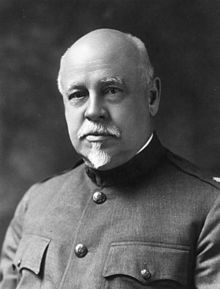William H. Welch
William H. Welch | |
|---|---|
 Welch as brigadier general circa 1917-1921 | |
| 1st Dean of Johns Hopkins School of Medicine and School of Public Health | |
| Personal details | |
| Born | April 8, 1850 pathologist |
| Signature | |
William Henry Welch (April 8, 1850 – April 30, 1934) was an American
Biography
Early life
He was born on April 8, 1850, to William Wickham Welch and Emeline Collin Welch in Norfolk, Connecticut. He had a long family history of physicians and surgeons, starting with his grandfather Benjamin Welch. Benjamin was also on the medical forefront of his time, establishing his county's medical association.[3] William H. Welch was educated at Norfolk Academy and the Winchester Institute, a boarding school. His father and a grandfather and four of his uncles were all physicians. William Henry entered Yale University in 1866, where he studied Greek and classics. Initially, Welch was not interested in becoming a physician; his primary ambition was to teach the Greek language.[4] He received an AB degree in 1870. As an undergraduate, he joined the Skull and Bones fraternity.[5]
Welch remained a lifelong bachelor. He was the uncle of Senator Frederic C. Walcott.
Early career
After a short period of teaching high-school students in
Later career at Johns Hopkins

In 1884, he was the first physician recruited to be a professor at the newly forming Johns Hopkins Hospital and Medical School at

Graduates of Welch's training programs were highly coveted as academic physicians. Medical schools and institutes across the country vied for Welch's former students and graduate scientists to fill top posts.
Welch's research was principally in bacteriology, and he is the discoverer of the organism that causes gas gangrene. It was named Clostridium welchii in recognition of that fact, but now the organism usually is designated as Clostridium perfringens.
From 1901 to 1933, he was founding president of the Board of Scientific Directors at the
Welch served in the
Death
Welch died on April 30, 1934, at the age of 84, of prostatic adenocarcinoma at Johns Hopkins Hospital.[2]
Honors and awards
- Welch was awarded the first ever gold-headed cane of the American Association of Pathologists and Bacteriologists.[10]
- Welch was elected to the American Philosophical Society in 1896.[11]
- Welch was elected to the American Academy of Arts and Sciences in 1897.[12]
- Welch was awarded the Royal Order of the Crown of Prussia in 1911.[4]
- In 1927, Welch received the Kober Medal from the American Association of Physicians.[4]
- The William H. Welch Medical Library at Johns Hopkins, which opened in 1929, was decided on March 5, 1928, to be named after him.[13]
- In 1931, Welch received the Harben Medal from the Royal Institute of Public Health for his professorship in the history of medicine.[4]
- In 1950, the first William H. Welch Medal was awarded by American Association for the History of Medicine to honor authors in field of medical history [14]
- Welch Road, in the vicinity of Stanford University Medical Center in Stanford, California, is named in his honor.[15]
See also
References
- ^ a b c d Johns Hopkins Medicine:The Four Founding Professors. Hopkinsmedicine.org. Retrieved on 2012-03-12.
- ^ New York Times. May 2, 1934.
- PMID 21738298.
- ^ a b c d e "Chronology of the Life of William Henry Welch". Chesney Medical Archives of the JHMI. Retrieved March 31, 2015.
- ISBN 0801845017
- ^ Institute of the History of Medicine history. Welch.jhu.edu. Retrieved on 2012-03-12.
- ^ Flexner, Abraham H. (1946), Daniel Coit Gilman: Creator of the American Type of University, New York: Harcourt, Brace and Company, p. 141.[dead link][ISBN missing]
- ^ "William Welch". www.nasonline.org. Retrieved 2024-03-11.
- PMID 28290967.
- ^ Medicine: Gold-Headed Cane, Time magazine, June 4, 1923, retrieved 2024-02-24
- ^ "APS Member History". search.amphilsoc.org. Retrieved 2024-03-11.
- ^ "William Henry Welch | American Academy of Arts and Sciences". www.amacad.org. 2023-02-09. Retrieved 2024-03-11.
- ^ Welch Library:history. Welch.jhu.edu (2008-07-15). Retrieved on 2012-03-12.
- ^ "William H. Welch Medal | American Association for the History of Medicine". www.histmed.org. Retrieved 2017-02-16.
- ^ "William H. Welch, M.D. ("the Dean of American Medicine") ‹ Back to Welch surname". GENi. GENi. February 20, 2015. Retrieved March 31, 2015.
Further reading
- Chronology of the Life of William Henry Welch
- Bench and Bedside, December 2007, "Honoring the Past"
- ISBN 0-670-89473-7. (This book covers a great deal of Welch's life as well as other medical people of the era.)
- Donald Fleming (1954). William H. Welch and the Rise of Modern Medicine. The Johns Hopkins University Press. ISBN 0-8018-3389-2.
- Silverman, BD (2011). "William Henry Welch (1850–1934): the road to Johns Hopkins". Baylor University Medical Center Proceedings. 24 (3): 236–42. PMID 21738298.
- PMID 21738298.
